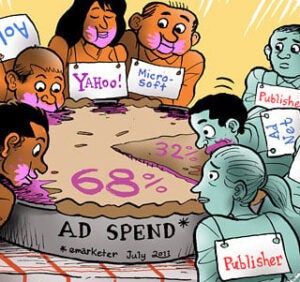“Data-Driven Thinking” is written by members of the media community and contains fresh ideas on the digital revolution in media.
Today’s column is written by Jay Friedman, president and partner at Goodway Group.
In the cola wars, it was Coke vs. Pepsi. In the battle of the coasts, it’s New York vs. Los Angeles. Rap? Tupac vs. Biggie. And of course, Google vs. Facebook in the battle for identity supremacy.
What’s most notable in each of these classic rivalries, though, is that each is two-way. Third place isn’t even in the discussion. Yet, that’s how it appears the identity wars are being framed. That it’s third place that’s up for grabs. Will it be LiveRamp’s ATS? The Trade Desk’s Unified ID? Or, perhaps Recurly, Piano, Zeotap, MediaWallah or one of the many others wins this portion of the market.
Meanwhile, the marketers that even have half of an eye watching this discussion are largely still putting the bulk of their money into Google and Facebook.But I don’t think it’s third place that’s up for grabs. I think it’s first.
Why is this believable? Because most marketers believe in the principles underpinning PRAM: Privacy is important, a healthy open internet is better for society, all marketers and publishers should have equal access to the mechanism for operating an addressable internet and don’t break the law.
“Equal access” is what PRAM and the IAB are focused on. Now it’s time for marketers and publishers to do the same.
While ad tech’s typical timeline for consolidation and shakeout can last five or more years, identity’s clock is ticking. IDFAs go away in early 2021. Cookies are still slated to be deprecated within 18 months. The industry doesn’t have the time for the process to play out the same way it always has. This market must be shepherded to its steady-state, and it’s in the hands of publishers and advertisers to do that.
To get there, I’d recommend we look at a few guardrails to keep us focused on the right outcome.
No kings needed
“Maybe we should just king-make one of them and move on?” I hear this unnecessary statement often. Government regulators in Europe, Australia, and the United States. are poised to act against this very notion with existing platforms. So, the solution is to make another? King-making is counter to the PRAM and IAB principles.
Open-source or trade-managed
If one end of the privatized spectrum is a handful of kings, the other end is a LUMAscape of companies all fighting to win the identity race. Neither of these solutions achieves marketers’ and publishers’ goals. The end solution must be open-source, or at a minimum managed by a trade association that listens to all but makes decisions for the greater good.
Win-win ≠ 100% positive for all
A mistake I see often is confusing the idea of a win-win deal with the idea that the end solution can’t have any downsides for any party. That’s not win-win, that’s a utopia. A viable solution will have downsides, but it will deliver on the PRAM and IAB principles.
There are firms who’ve taken funding that will no longer be relevant. One company’s fingerprints will be on the solution more than another. There’s likely one bitter pill or another in here for all of us, and it will be a small price to pay as an industry.
A big olive branch to consumers
Speaking of bitter pills, I’d recommend that PRAM and the IAB include a heavy olive branch to consumers in our way forward. As Brian O’Kelley famously said, advertising is no longer good when it’s “creepy.”
What if SKU-level retargeting was sacrificed in this way forward? Or, requiring at least three hours before retargeting? Perhaps cross-device retargeting requires a 24-hour delay? Even the appearance that our identities aren’t fully wired up together in the background would go a long way toward quieting the (oft misinformed) privacy and “surveillance capitalism” crusaders.
An open internet with an open mechanism for addressability is very achievable. It’s time for our industry to play the long game.
Follow Jay Friedman (@jaymfriedman) and AdExchanger (@adexchanger) on Twitter.














